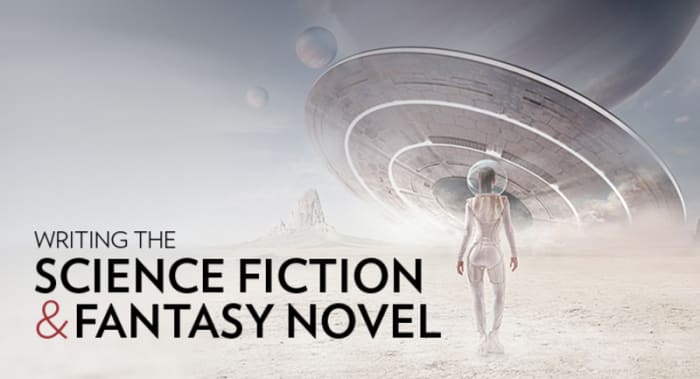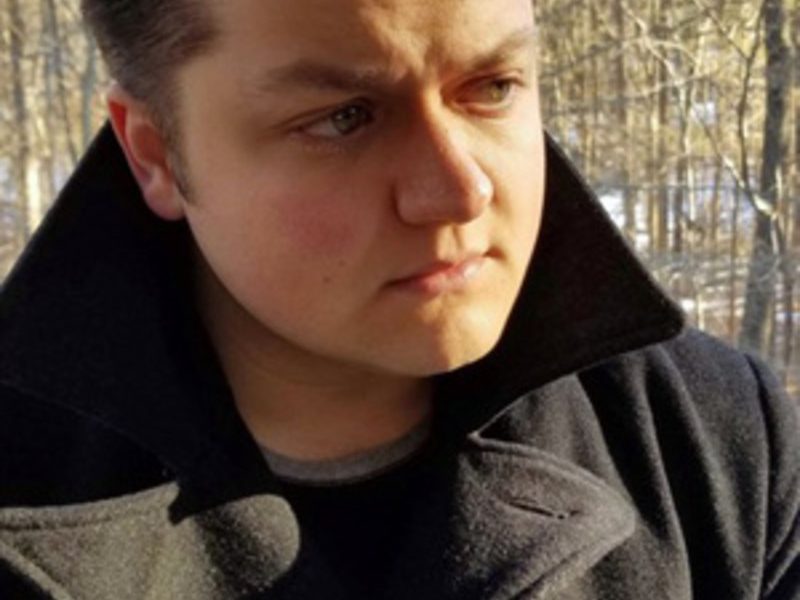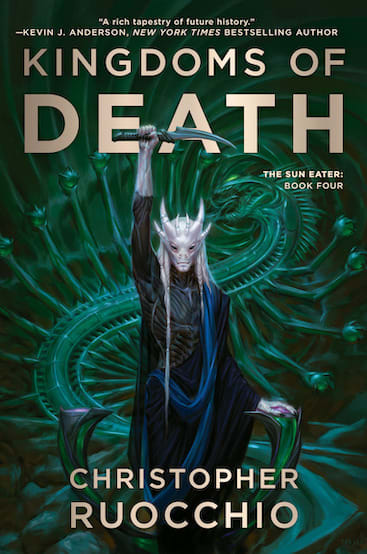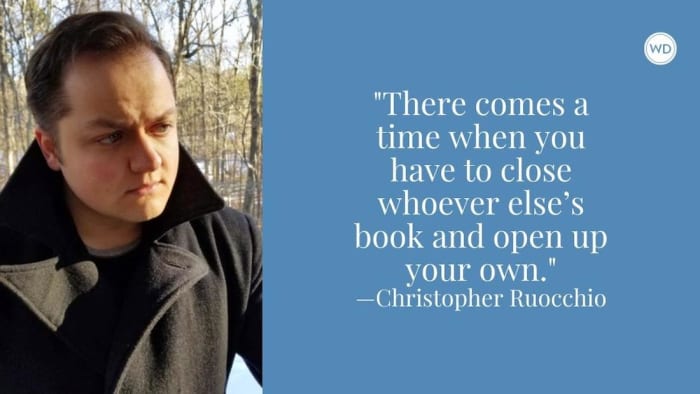Christopher Ruocchio: On the Natural Growth in Writing a Series
Christopher Ruocchio could read almost before he could speak, and so when he realized he would never be an astronaut, he decided to be a novelist. He began writing when he was eight years old, and sold his first novel at twenty-two. He is also the Assistant Editor at Baen Books and a graduate of North Carolina State University. He is the author of the Sun Eater series, beginning with Empire of Silence. Find him on Facebook and Instagram.
In this post, Christopher discusses the process of writing his new science fiction novel, Kingdoms of Death, how paper costs and available materials offered him an opportunity to grow as a writer, and more!
Name: Christopher Ruocchio
Literary agent: McCarthy Literary Agency & Baror International
Book title: Kingdoms of Death
Publisher: DAW Books
Release date: March 22, 2022
Genre/category: Science Fiction
Previous titles: Empire of Silence, Howling Dark, Demon in White
Elevator pitch for the book: The Sun Eater is the tale of Hadrian Marlowe, a nobleman of the galactic empire some 20,000 years into our future, a scholar forced to be a soldier in a bitter, thousand-year war between mankind and the Cielcin, the first alien species in history to ever threaten us. Written as a memoir, Hadrian tells us on page one that he ended the war and dealt with the Cielcin for good and all … his story is why, and how, and about all the things not in the official record.
IndieBound | Bookshop | Amazon
[WD uses affiliate links.]
What prompted you to write this book?
The whole Sun Eater series grew out of my affection for science fiction and fantasy literature more generally, as is the case for most of us spec fic writers, I think. I’m not sure the series has one single germ at the root of it, but if it does, it was probably my desire to try and reconstruct the hero myth.
We live in a culture—especially a literary culture—that delights in deconstructing traditional tropes and archetypes. I wanted to try and do the reverse, to acknowledge the critiques of things like the hero’s journey, but to move past simple critiques (we never seem to move past simple critiques these days) to address what comes next, which for me is to acknowledge that yes, heroes can be monsters sometimes, but often an angel is only a demon that stands between us and our enemies. That’s Hadrian—leastways that’s the case Hadrian is trying to make for himself in the books.
How long did it take to go from idea to publication? And did the idea change during the process?
It depends on how you count. In some form or other, I’ve been working on this series since I was about eight years old. But a more reasonable answer would be to say I got serious when I arrived at university in 2011. I sold the books to my publisher in 2016, and my first novel, Empire of Silence, came out in mid-2018.
As for Kingdoms of Death, it took about a year and a half to write and edit and make it to publication, which was longer than I intended due to the impact the pandemic had on my old day job. Until the pandemic, I’d been able to publish a novel a year, and I intend to return to that pattern now my life is smoothing out.
As for whether the series has changed with the process, absolutely, but it may be more accurate to say it’s grown. My original contract was for four books, but as of now we’re probably looking at a 7-book series.
Were there any surprises or learning moments in the publishing process for this title?
Limitations caused by the rising cost of paper led us to split the original manuscript into two books: Kingdoms of Death and Ashes of Man (December 2022). It’s easy to forget sometimes that there are concrete business factors that impact publishing, and learning how to deal with and work within the constraints imposed by things— like shipping costs and the availability of material—forced me to grow in some new directions as an artist, as I had to develop some new editing strategies to cope with splitting the manuscript into two.
Were there any surprises in the writing process for this book?
Not especially, unless it was the split mentioned above. Ever since my second novel, Howling Dark, I’ve become a big outliner, and so I typically know the whole book already on page one.
I was pleased, though, that I stuck to the plan and took the risks I knew I wanted to take going in. Some of the choices were difficult ones, and I hope those risks pay off with my readers.
What do you hope readers will get out of your book?
Escape, first and foremost. The world is not a terribly pleasant place, and while the world of the Sun Eater books is certainly less pleasant than our own, Hadrian and my other characters are—perhaps—better situated to do something about that than we are with regard to our own.
Kingdoms of Death is certainly the darkest of my works so far, but I hope that readers take away a thing or two about the resilience of the human spirit and perseverance in the face of that darkness.
If you could share one piece of advice with other writers, what would it be?
I’d not presume to advise my fellow professionals, but for anyone reading aspiring to be a writer, I’d say this: Writers often say that to be a writer you have to read, to read a lot and read often. That’s absolutely true, but I’m always surprised when those same writers do not tell hopeful writers that they need to write.
It sounds obvious, but so many of the people I talk to struggling with their first book will talk to me at length about their reading, their research, their worldbuilding, etc. Those are all fine things, but they’re only related pursuits.
There comes a time when you have to close whoever else’s book and open up your own. Schedule time every day to write. I know it’s hard, we all have jobs and family and other obligations, but even a page a day is perhaps more than many are getting done at present.

Do you daydream about distant worlds and mythical creatures? If so, take this six-week course and transform your ideas into creative science fiction and fantasy novels. You’ll discover the essential elements of fictional worlds, how to write a science fiction novel with intriguing characters and plot, and write up to 2,500 words for your science fiction or fantasy story.




